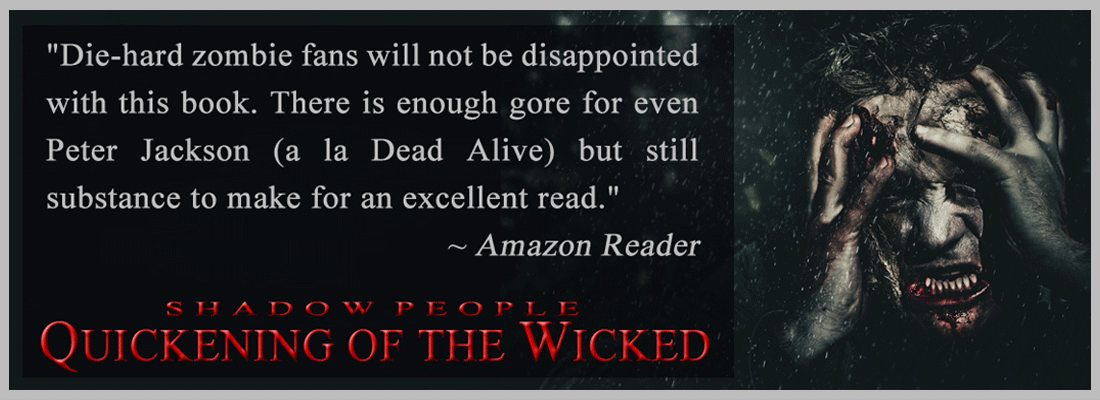Why We Wrote Shadow People:
When we first entertained the idea of writing a novel together, we decided on a hardcore horror novel because that is the type of fiction we most often read. At times, we are disturbed that we use narratives of misery as entertainment and we have questioned ourselves. We arrived at the conclusion that we use it as an escape mechanism, as a distraction from our often problematic and mundane lives. For no matter the extent of our boredom or our trials and tribulations, nothing is as bad as the fiction we read.
We included zombies into the mix and we tried to follow the general rules of zombie protocol while at the same time creating them fresh and unique in their design. We do understand that some readers might find the story disturbing and we never meant it for anyone not accustomed to hardcore horror fiction. The very nature of the story was to bring to the forefront horrific human misery which included murder, torture, starvation, severe poverty, child abuse, infectious negativity, and greed. These wretched conditions are what bring forth the shadow people. We knew that these disturbing elements would be hard on some readers but we also thought that perhaps if fewer of us participated in the great turning away and faced the atrocities inflicted on humans by humans, there might be less suffering in the world.
We wanted to create a horror story that went beyond terror, violence, and gore. We wanted it veined with intelligence and substance. Our novel contains a great deal of mysticism that encompasses all religions. We went into the story knowing that some readers might consider the spiritual nature of the book "over the top" but we hoped it would not exceed the normal bounds of fantasy anymore than zombies or shadow people. The focus on mysticism was primarily given as food for thought and aimed at those who lean towards non-conformity. As JFK once said, "Conformity is the jailer of freedom and the enemy of growth." The accounts of spiritualism offer the divine belief in one's self but the reader must go in with an open mind. The moral message of the story is that one does not have to change who they are but rather they can be much more than they are if they would only dare override the world's consensus of thought that they 'can't' and believe they 'can'.
The focal point of the prologue was the horrifying conditions of everyday life in present day Monrovia and we offered this through the tale of fifteen orphans. It was our intent to convey the Monrovian's sense of hopelessness through the telling of the everyday plight of the orphans and we purposely moved the prologue along quickly. In the first chapter, which introduces Grace as our primary female protagonist, the pace is a little slower and the agony she endures as a result of bad religion is fully depicted. In the second chapter, the story moves back to The Wraith. This chapter is the longest and one of the most gruesome of the entire book. In order to give the reader some horror relief, the third chapter introduces Lily and a glimpse into her family life is given, which is an example of American materialism and greed although Lily herself, 5-years-old, blind, and precognitive, is very sweet. Finally, chapter four establishes our male protagonist, Aeden. From that point on the chapters alternate between Grace, Lily, and Aeden.
We thought long and hard about how to tell the story of three characters who were living in different cities. We concluded that it would be best to rotate their stories chapter by chapter so the reader could understand what each of them were experiencing during the same time frame with the question, "Could they all survive long enough to find each other?" Every chapter closes with a mini-cliffhanger in hopes of keeping the reader wanting to move forward. We are aware that some people will not like the style we chose. We know we'll never please everyone, all the time. Although, we wish we could.




